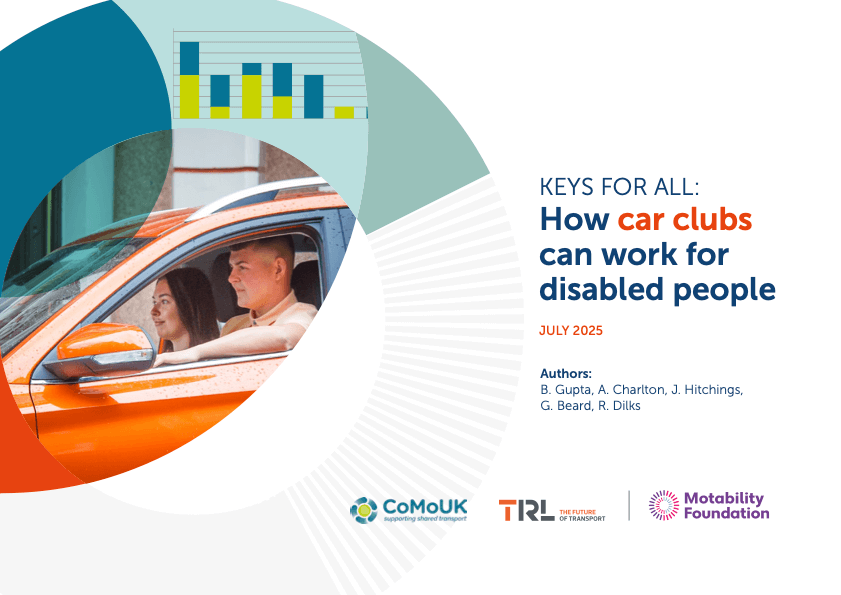Disabled people and shared transport
Improving access to shared micromobility for disabled people
The scope of shared micromobility schemes has expanded over recent years to include e-bikes and e-scooters. While this has opened up the benefits of shared modes to more people, plus the CoMoUK Annual Report shows that 7% of users have a long-term health condition which affects daily activity, we want to see this figure increase to broaden inclusion and access.

Our collaborative research
Research CoMoUK collaborated on with RiDC (Research Institute of Disabled Consumers), commissioned by the Motability Foundation, found that many more disabled people would like to access services but there were several barriers preventing this.
The report, Raising the bar - Boosting the accessibility of shared micromobility, identified three core areas to improve:
Awareness and education
Accessible vehicle design
Accessible digital platforms

Raising the bar - Boosting the accessibility of shared micromobility

Shared micromobility pilot project
CoMoUK is now working on a pilot project, which aims to tackle the first challenge of the list - Awareness and Education.
The project will test a number of outreach and confidence building activities to support disabled people to use the existing models of shared bikes, e-bikes and e-scooters. The project, being delivered in partnership with Cycling UK in Salford, Salford City Council, Lime and Beryl, will run across the spring and summer of 2025 and report key findings at the end of the year.
Across this and all projects we are engaging extensively with disabled people, disabled people’s organisations and stakeholders across public, private and third sectors.
Improving access to cars clubs for disabled people
Research has been carried out by CoMoUK with TRL, funded by the Motability Foundation, to look at car clubs and disabled people’s needs, challenges and opportunities with them.
The research has involved reviewing academic literature, interviews with key stakeholders and carrying out surveys and focus groups. The research has identified key barriers which need to be addressed.
Along with our partners TRL we are now looking at what actions could in future be piloted to boost access. The research report and recommendations will be published in spring 2025.

Keys for all: How car clubs can work for disabled people
This research was carried out by CoMoUK with TRL, funded by the Motability Foundation, to look at car clubs and disabled people’s needs, challenges and opportunities with them.
The report is the result of the first ever in-depth investigation into the barriers facing disabled people in accessing car clubs, with the aim of making them more inclusive.
The report sets out a vision for inclusive car clubs, where staff would be equipped with the knowledge and skills to provide high quality support for disabled people, through a range possible solutions:
- A major awareness raising campaign and improvements to car club websites and apps so they are easier to use.
- A “full audit” of the accessibility of car club websites, apps and communications so they are optimised for disabled people, and specialist training for car club staff.
- A pilot which would test out ways of making car clubs more attractive for disabled consumers, such as trial a discount system and more flexible cancellation policies recognising the unpredictable nature of certain impairments.
- Better information about the accessibility of car club vehicles to be made available by operators, as well as backing the rollout of a wider range of adapted vehicles over the longer term.
Along with our partners TRL we are now looking at what actions could in future be piloted to boost access.


